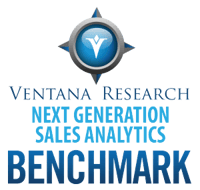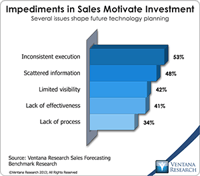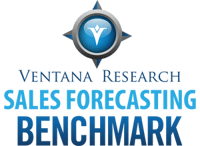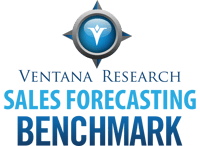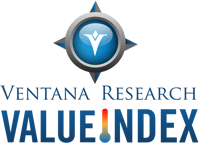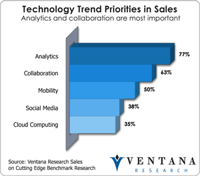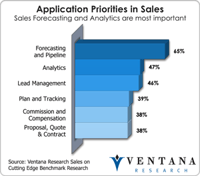All lines of business are under pressure to meet targets and deliver expected results, but none is under more pressure than Sales. Like other organizations it must use information to derive insights about progress and problems and to decide what changes to make. Today businesses collect and analyze data from more data sources in more forms than ever before. To understand it they need effective analytics, and again none need it more than Sales.
Read More
Topics:
Big Data,
Sales,
Sales Performance,
Operational Performance,
Business Analytics,
Business Collaboration,
Business Intelligence,
Cloud Computing,
Financial Performance,
Information Applications,
Sales Performance Management,
SFA
Most people in business management admit that sales is more an art than a science. Organizations have long struggled to find the right mix to improve its effectiveness, and few get the most out of available technology. For many the default is still to use sales force automation (SFA) and spreadsheets to manage processes and try to increase the productivity of sales staff. In our view they should take a holistic approach to sales processes from contact to close and support everything from sales...
Read More
Topics:
Sales,
Recurring Revenue,
Sales Compensation,
Sales Forecasting,
Customer Performance,
Business Collaboration,
Business Mobility,
Cloud Computing,
CRM,
SFA
In recent years line-of-business applications including accounting, human resources, manufacturing, sales and customer service have appeared in the cloud. Cloud -based software as a service (SaaS) has replaced on-premises applications that were previously part of ERP and CRM environments. They have helped companies become more efficient but have also introduced interoperability challenges between business processes. Their advantage is that cloud software can be rented, configured and used...
Read More
Topics:
Sales Performance,
Supply Chain Performance,
ERP,
Office of Finance,
Order Management,
Operational Performance,
Business Analytics,
Business Performance,
CIO,
Cloud Computing,
Customer Service,
Financial Performance,
CFO,
SFA
Few sales organizations realize their full potential, partly because they don’t execute well. We urge organizations to move beyond conventional wisdom in how they think about executing sales processes and have placed methods for making improvement to sales execution at the center of our research on sales in 2014. In our recent research on sales forecasting almost half (44%) of sales organizations said they have impediments that are motivating management to consider further investment in sales...
Read More
Topics:
Sales,
Sales Performance,
Salesforce.com,
Qvidian,
Sales Coaching,
Sales Force Automation,
Operational Performance,
Business Analytics,
Cloud Computing,
SFA
Sales forecasting is an essential process for most businesses. It helps guide the efforts not only of the sales function but also of finance, operations, manufacturing and customer service. Our recently released sales forecasting benchmark research reveals significant insights and best practices that can help companies optimize the effectiveness of this process. I recently wrote that most sales organizations need to make significant changes to the way they do sales forecasting. In that analyst...
Read More
Topics:
Sales,
Sales Performance,
Sales Forecasting,
Operational Performance,
Business Analytics,
Business Intelligence,
Cloud Computing,
Information Applications,
SFA
In today’s highly competitive sales environment, where success depends on meeting the specific needs of buyers, an accurate and timely sales forecast is a critical tool for optimizing business outcomes. I discussed this as part of our 2014 research agenda for sales, noting that linking the forecast to commissions, quotas and territories is a requirement for success. We recently completed new benchmark research on sales forecasting to ascertain the state of the processes and technology sales...
Read More
Topics:
Sales,
Sales Performance,
Supply Chain Performance,
Sales Forecasting,
Sales Operations,
Operational Performance,
Business Analytics,
Business Collaboration,
Business Intelligence,
Business Performance,
Cloud Computing,
Customer & Contact Center,
Financial Performance,
Information Applications,
Information Management,
SFA
It should be no surprise for those who work in sales that increasing outcomes collectively is not always easy. Sales teams and individuals work under pressure to perform at high levels, selling more than they did in the previous period or more than the person who previously had responsibility for a territory. Today’s economic and competitive environments demand that everyone work not just faster but smarter in their sales efforts. To excel in this environment requires not just wise use of time...
Read More
Topics:
Big Data,
Sales,
Sales Performance,
Social Media,
Operational Performance,
Business Analytics,
Business Collaboration,
Business Performance,
Cloud Computing,
Customer & Contact Center,
Governance, Risk & Compliance (GRC),
Compensation,
Sales Performance Management,
SFA
Most organizations see improving the effectiveness of sales as a way to increase productivity. Those organizations that take advantage of the latest sales applications and technology are finding themselves with a competitive advantage, but many organizations lack the time and resources to assess and deploy appropriate platforms. That’s a shame, since most sales organizations have plenty to improve in their selling, forecasting, incentives and planning according to our latest research on sales...
Read More
Topics:
Sales,
Sales Performance,
Marketing,
PIM,
Sales Compensation,
Sales Forecasting,
Operational Performance,
Business Performance,
Financial Performance,
CPQ,
CRM,
Product Information Management,
SFA
I attended Oracle’s annual OpenWorld conference this week. The company claims it holds the world’s largest technology conference, with 50,000 attendees and a million people viewing sessions online. It was a great opportunity to get close to the Oracle Fusion Applications, which the company presented as proven and ready, with customers using them on-premises and in private and public cloud computing usage methods. In keynotes from executives Larry Ellison, Mark Hurd and Thomas Kurian and...
Read More
Topics:
Sales,
Sales Performance,
Salesforce.com,
SAP,
Social Media,
Mobile Technology,
Social Collaboration,
Operational Performance,
Business Analytics,
Business Collaboration,
Business Intelligence,
Business Performance,
Cloud Computing,
Customer & Contact Center,
Information Management,
Oracle,
Workforce Performance,
CRM,
SFA,
Workday,
Workforce Analytics
It’s clear that sales organizations need to be efficient, but many are unaware of critical applications they could deploy to establish sales excellence. In my recent analysis, “Sales Organizations Need a Swift Technology Kick”, I outlined why sales departments have to look beyond using sales force automation (SFA) and spreadsheets and examine dedicated applications for improving productivity and effectiveness. Our benchmark research in sales applications found a new set of application...
Read More
Topics:
Sales,
Sales Performance,
Social Media,
Supply Chain Performance,
Sustainability,
Sales Forecasting,
IT Research,
Operational Performance,
Business Analytics,
Business Collaboration,
Business Intelligence,
Business Mobility,
Business Performance,
Cloud Computing,
Customer & Contact Center,
Financial Performance,
Governance, Risk & Compliance (GRC),
Information Applications,
Information Management,
Location Intelligence,
Operational Intelligence,
Workforce Performance,
SFA
